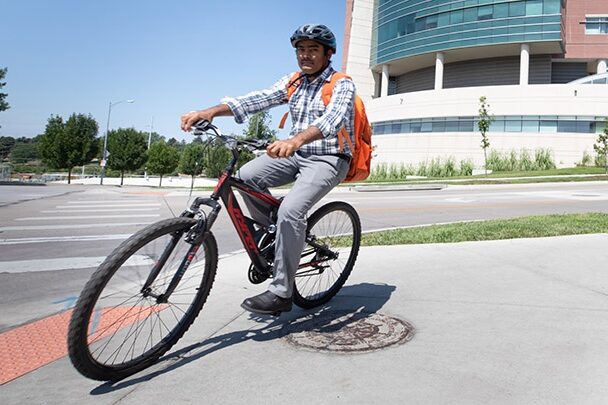News stories are showing a decrease in greenhouse gas (GHG) emissions in places around the world. A Stanford University study of China estimated that by early March, reduction in pollution already had saved (by most conservative measures) more than 53,000 lives there.
Here in Nebraska, statewide traffic volume decreased as much as 35% during the week of April 12- 18 when compared to annual averages from 2016-2018 for the same time period. Traffic on Omaha’s streets and highways decreased by as much as 39% in mid-April. While this is not a tool that shows local impacts of GHG emissions and reduced travel, a new interactive tool simulates various emission scenarios and allows users to change the percentage of people living in the U.S. participating in climate-friendly behaviors, such as working from home.
While this extraordinary reduction of GHG emissions is something to take note of, the effects may be temporary. Stay-at-home orders will not last forever, and when cities reopen, societies and economies will start to return to business as usual. If that happens, global GHG emissions could rebound and return to pre-COVID-19 levels, compromising everyone’s health.
That said, these reductions demonstrate the impact we can have as individuals. Every time we choose to walk, bike, carpool, or use transit, we reduce those harmful emissions and have a positive effect. Our impact can be even greater as our actions can help to guide decision makers as the “next normal” begins: reductions were great enough in Milan, Italy, that city officials are changing how the city reopens, re-imagining and redesigning city streets and sidewalks that prioritize pedestrians and cyclists and their safety.
National Transportation Week may be a little different this year, as we focus on walking and biking to maintain social distancing. UNMC also has joined forces with the University of Nebraska at Omaha to take part in the National Bike Challenge. It runs May-September, and participants can create their own goals, log bike miles (for commuting or recreation). It’s app friendly and offers prizes. Members of the med center community and their families can join the UNMC/Nebraska Medicine team.
Regardless of the changes made, every trip that uses active transportation improves the health of everyone who breathes.

One consequence that seems to be emerging from this pandemic is that as life opens up to whatever our new normal will be, there is not a good way to social distance using public transportation. Especially in cities larger than Omaha. This unfortunately may lead to more automobile traffic and use of fossil fuels. How can we focus and support more fuel efficiency or electric vehicle options? Can mass transit change dramatically to be safer yet conserve resources?